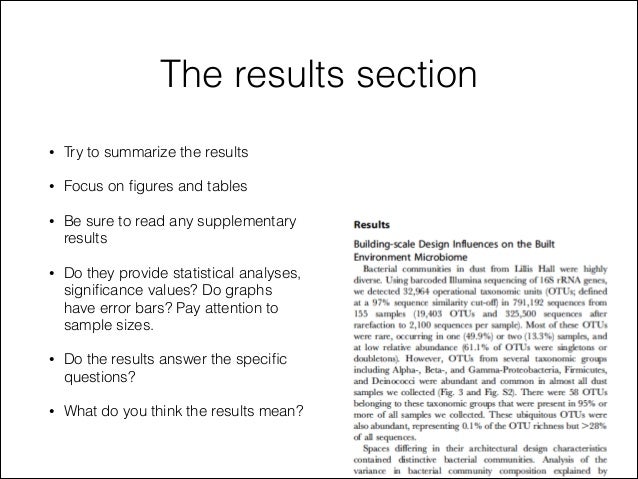
· The results section of a quantitative research paper is where you summarize your data and report the findings of any relevant statistical analyses. The APA manual provides rigorous guidelines for what to report in quantitative research papers in the fields of psychology, education, and other social sciences. Use these standards to answer your Estimated Reading Time: 8 mins When writing the results section, avoid doing the following: Discussing or interpreting your results. Save this for the next section of your paper, although where appropriate, you should compare or contrast specific results to those found in other studies [e.g., "Similar to the work of Smith [], one of the findings of this study is the strong correlation between motivation and Author: Robert V. Labaree Writing the Results and Findings of Research This paper presents the likely results and findings of the proposed research on the social media selections and strategies of blogger.comted Reading Time: 5 mins
Purpose of Guide - Organizing Academic Research Papers - Research Guides at Sacred Heart University
This article is part of an ongoing series on academic writing help of scholarly articles. Previous parts explored how to write an introduction for a research paperliterature review outline and formatand how to write a research methodology.
Academics and researchers publish their scholarly articles to show the results they have obtained using gathered or collected data. Research papers present the process of testing hypotheses or models and how their findings help shape or advance a particular research topic.
The findings of your research should be included in a separate section of your academic article, as it is the only section that contains data and results. The academic writing should be clear, impartial, and objective. Each result, which confirms or refutes your assumptions, should be noted in an unbiased manner to increase the credibility of your study.
These sub-sections or divisions can be based on:. If you have used statistical analyses in your academic article, and found answers to your research questions, report those facts in relation to your question.
In any case, writing results section of research paper, your results:. For example, in your empirical analysis you notice an uncommon correlation between two variables. In the Results section, it is okay to bring up this outcome, however, posing new hypotheses for this uncommon result should be presented in the Discussion section. Instead writing results section of research paper using only descriptive text for your scholarly article, consider other visual ways and representations that improve the academic writing of your research paper.
Figures, tables and graphs are useful methods for gathering a great deal of information into one place that can then be mentioned in the content of your article.
If any research question or hypothesis is confirmed by your data and analysis, you can point to a table or figure that illustrates your finding. When you present tables or figures in your results section, make sure to describe at least some of the data included in these visual representations so that readers can clearly understand how the table works and what interpretations can be concluded from them.
You can also use appendices if you have many other helpful figures or tables that cannot be fully included in the text of your academic article. A systematic description of your research results and a correct data analysis and interpretation are related to statistical significance, as they help avoid speculations or misinterpretations by readers of your academic article.
Tests of statistical significance should always be presented with your results to show that your research findings objectively confirm or disprove your hypotheses. You need to report the research results with enough details so that readers can see which statistical analyses were conducted and validated to justify or disprove your hypotheses.
Even if not all of your research results are confirmed, you should not ignore them, writing results section of research paper. These negative results that do not support a particular hypothesis should be noted in the results section, and then explained in the Discussion section. Writing a Research Results section that do not address the negative results, invalidates the research paper and does not reflect appropriate academic writing.
However, there are instances when it is appropriate to compare or contrast your results with findings from previous and similar studies. For writing results section of research paper. This blog series focuses on useful academic writing tips. Next, we examine the Discussion and Conclusion section. Find our more on writing high-quality research papers.
Journals Expert Journal of Finance Expert Journal of Economics Expert Journal of Marketing Expert Journal of Business and Management Send Your Article. Facebook Twitter Google Plus Pinterest LinkedIn. Use these tips for your academic article's Research Results section and organize your findings in line with academic writing requirements, writing results section of research paper.
You may also like. Writing results section of research paper of Publisher Related Policies and Links October 24, Responsabilities of Publisher Responsibilities of the Publisher in the Relationship with Journal Editors October 24, Responsabilities of Publisher General Duties of Publisher October 24,
How to Write a Dissertation Results Section - Scribbr ��
, time: 3:54How to Write the Results Section of a Research Paper - Expert Journals

· Present the results of the paper, in logical order, using tables and graphs as necessary. Explain the results and show how they help to answer the research questions posed in the Introduction. Evidence does not explain itself; the results Author: John Sisson How to Write the Results Section of a Research Paper · The results section should simply state the findings, without bias or interpretation, and arranged in a logical sequence. The results section should always be written in the past tense. A section describing results [a.k.a., "findings"] is particularly necessary if your paper includes data generated from your own research
No comments:
Post a Comment